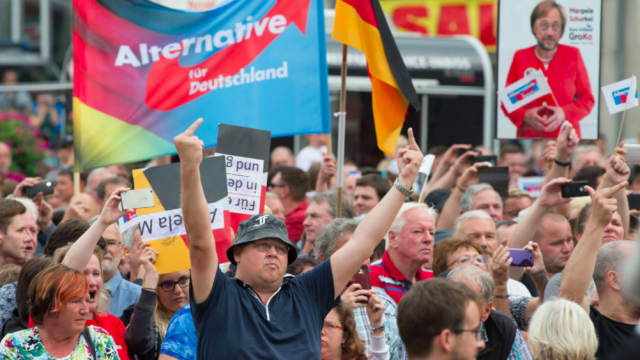
The German election last month once again secured Chancellor Angela Merkel and her centrist Christian Democratic Union's position in government, but it also heralded the dramatic rise of Germany's populist far-right party, Alternative for Deutschland (AfD), the country's first right extremist group to enter the Bundestag since World War II.
In an unprecedented turn, the AfD – which was founded in 2013 primarily as a Eurosceptic party, before its deeper xenophobic message took hold – garnered nearly 13 percent of the national vote, placing third after the CDU and the Social Democratic Party. The bulk of its supporters hailed from formerly Communist-occupied parts of East Germany; according to voters in AfD strongholds, the "Revenge of the East" resulted from Merkel's "lack of respect" for Germans in the region, who accused her CDU of wasting money on immigrants while their local economies crumbled.
What was perhaps most surprising was the sudden influx of support the party received from a large number of former non-voters. Put simply: As in the case of Donald Trump's electoral victory in the U.S. last November, the AfD triumphed in part because many former non-voters were stirred by its virulently racist, anti-immigrant message, and their votes flipped the results.
Amid a flurry of dangerously insensitive comments from its spokespeople – the most famous was Bjorn Hocke's description of Berlin's Holocaust Memorial as a "Monument of Shame" to the German people – the AfD experienced an alarming surge of popularity in recent months, running on an entirely reactionary political platform.
During the highly controversial campaign, party leadership openly criticized Angela Merkel's "immigrant welcoming policy". According to campaign promises, the AfD intended to change the German constitution to allow for the immediate deportation of any immigrants who had failed in their asylum appeals, regardless of whether or not their country of origin was deemed safe. In addition, they vowed to try immigrants as young as 12 years old as adults, and to condemn "alternative" lifestyles up to and including what they deemed "Islamification".
Controlling the Message
Also like Trump, the AfD expressed open hostility to mainstream media outlets and focused almost entirely on building up a presence across social media. Operating through Discord channels, YouTube videos and online forums such as Reconquista Germania and Infokrieg, the AfD summoned its most hard core, reactionary supporters to catapult the party into the media spotlight.
In some cases, Bavarian AfD supporters even went so far as to create fake social media accounts, a la the Russians, in order to manipulate Twitter into promoting certain hashtags, or simply to infiltrate opposing groups and harass their users. While AfD supporters hailed the trolling technique as a "groundbreaking" strategy, it revealed a far more disturbing trend taking place throughout Europe.
Across the Old Continent, the left seems to be slowly but surely losing ground. Since 2008, the European Union has been fighting a losing battle to rescue its member states' economies, using elaborate polices that failed to bear fruit and almost tripled the number of people on the brink of deprivation. Meanwhile, parties running on socialist, pro-worker platforms have begun to fade from existence; organizations like the Italian and Greek Socialist Parties (PSI and PASOK, respectively) are increasingly irrelevant despite their once historic impact on their countries' politics.
There's a reason for this. The popularity of those left-leaning parties hinged not only on the presence of a strong working class but also a burgeoning middle class – both of which have been greatly diminished, if not virtually dismantled over the past decade due to Brussels' over-reaching policies. It comes as little surprise that Europeans should then pick the side that promises to tear down the failed leadership of the past – even if it brings with it the racist rhetoric of the bad old days of the 20th century.
And yet, those who are peddling their toxic, xenophobic rhetoric seem also to lack staying power. Since its inception, the AfD has been clearly divided across a "moderate" and an "extremist" side, with its spokespeople going off on wild tangential rants that have in equal parts been supported and condemned by the party's leadership. Surprisingly, Frauke Petry, a key member of the AfD's caucus, resigned from her position mere hours before the conclusion of the federal elections, without giving prior notice. According to Alice Weidel, a member of the extremist wing of the AfD, Petry's act was “hard to beat in terms of irresponsibility... [She did well to leave]... to prevent further harm.”
There also appears to be considerable regret among AfD's voters – only 34 percent of whom said they experienced no regret after casting their vote for the unorthodox rightwing party. Alexander Gauland, one of the party's leaders, announced that the AfD will keep true to its word and "hound" the CDU in the Bunderstag in order to curb its pro-immigration and EU-centric policies. In response, Merkel, currently in her fourth term as Chancellor, replied: “I don’t think so. There are of course differences ... but AfD will have no influence.”
3 WAYS TO SHOW YOUR SUPPORT
- Log in to post comments















